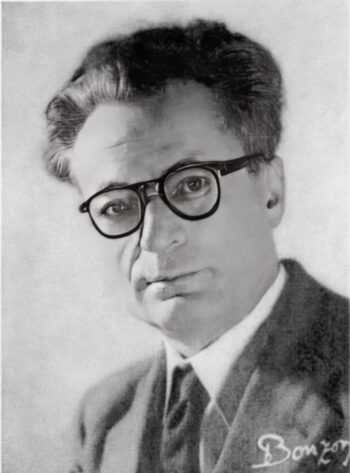Rassinier, Paul

Paul Rassinier (18 March 1906 – 28 July 1967) was a French high-school teacher. Born in Bermont, France, Rassinier joined the French Communist Party in 1922, at the age of only 16. In the course of time, however, Rassinier turned to pacifism and opposed the nationalization of private property advocated by the Communists, which is why he was expelled from the party in 1932. He joined the Federation of the Socialist Party two years later. In this party, too, he advocated his pacifism, which tended, among other things, to seek an understanding with Germany rather than a warlike conflict. From 1933 to 1943, Rassinier taught history at the Collège d’enseignement général in Belfort.
Immediately after the occupation of France by German troops, he helped establish the non-Communist resistance group Libération-Nord, where he tried to implement his policy of renouncing violence. In this context, he published an underground newspaper titled La Quatrième Republique (The Fourth Republic).
In 1940, due to anti-Jewish measures by the occupying regime, Rassinier began to provide false papers to Jews who wanted to flee France so that they could travel to Switzerland without problems. As a result of this activity, he was arrested by the Gestapo on 30 November 1943, and deported to the Buchenwald Camp. From April 1944 until his liberation by U.S. troops in April 1945, he had to build German “retaliatory weapons” (V-Waffen) in the Dora subcamp under terrible conditions.
After the war, Rassinier, who was severely disabled due to his time in German concentration camps, joined the French Socialist Party and became involved in the leadership of the Belfort party district. As an replacement of a deceased member of parliament, he occupied a seat in the French parliament in the fall of 1946, but lost it in the elections held shortly thereafter. Because of his resistance activities during the war, he received the French Gold Medal of Recognition and the highest award of the resistance movement, the High Red Rosette.
Because of his principle of nonviolence, he opposed the violent “purges” of former collaborators (“épurations”) carried out in post-war France, which made him unpopular among many opinion leaders in France, especially the spiteful Communists.
The contrast between what he himself had experienced in the Buchenwald and Dora Camps, and what some other survivors published about these camps, made him a critic of survivor literature. On the one hand, he criticized that this literature concealed the fact that prisoners who collaborated with the SS ran the internal operations of the concentration camps, and that many of these prisoner functionaries, and not the SS, had been responsible for certain abuses and atrocities in the camps. On the other hand, Rassinier denounced as false claims that mass exterminations by means of gas chambers had taken place at Buchenwald Camp, since, in his experience, there was no homicidal gas chamber at the Buchenwald Camp – a fact confirmed today by all historians.
His more autobiographical approach, which characterizes his first book Ulysses’s Lie (a merger of his two French books Passage de la ligne and Le mensonge d’Ulysse) as well as What Now, Ulysses? was complemented by his later works, which expanded his personal experiences to a more holistic-historical approach, in which the phenomenon of German concentration camps is examined in a broader, more general context. However, these works were written by a man with very limited means and no access to archival resources, and at a time when historical knowledge about these issues was just starting to evolve. Therefore, these non-autobiographical books are outdated today and should themselves be seen as objects of history rather than history books.
Today, Rassinier is rightly considered the “Father of Holocaust Revisionism,” as he was the first to critically scrutinize the mainstream narrative, systematically apply the technique of source criticism to witness accounts on the Holocaust, and express his disbelief in a German extermination policy in general, and the existence of homicidal gas chamber in particular. His book on his personal experiences in two German camps – Ulysses’s Lie – remains an important standard to assess the credibility of other witness accounts in this matter.
Works by Rassinier
- Passage de la ligne, La Librairie française, Paris, 1948.
- Le mensonge d’Ulysse, La Librairie française, Paris, 1950.
- Ulysse trahi par les siens, La Librairie Française, Paris, 1961.
- Le véritable procés Eichmann ou les vainquers incorrigibles, Les Sept Couleurs, Paris, 1962.
- Le drame des juifs européens, Paris, 1964.
- L’opération vicaire, La Table Ronde, Paris, 1965.
- The Real Eichmann Trial or The Incorrigible Victors, Institute for Historical Review, Torrance, 1976.
- Debunking the Genocide Myth, The Noontide Press, Torrance, CA, 1978.
- The Holocaust Story and the Lies of Ulysses, 2nd ed., Institute for Historical Review, New Port Beach, 1990.
- Ulysses’s Lie, Castle Hill Publishers, Dallastown, PA, 2022.

You need to be a registered user, logged into your account, and your comment must comply with our Acceptable Use Policy, for your comment to get published. (Click here to log in or register.)